How to Check Your Driving Record: Legal Insights, FAQs, and Everything You Need to Know
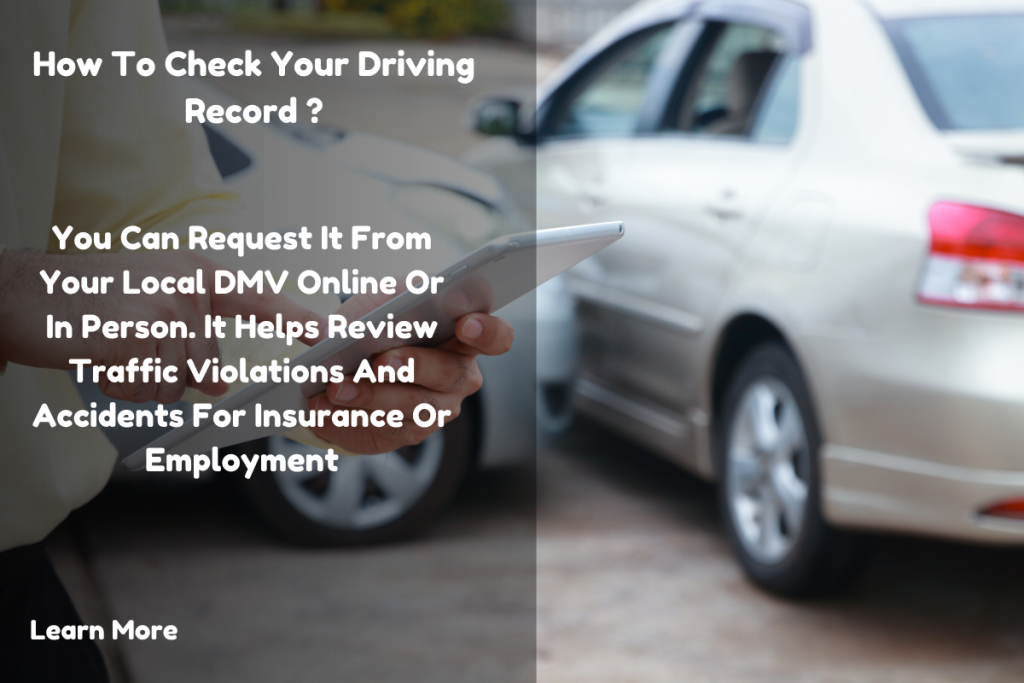
Understanding Your Driving Record and Why It Matters
A driving record is an official summary of your history as a driver. It includes crucial details such as your traffic violations, accidents, license suspensions, and the points accumulated on your license for various infractions. This record is maintained by your state’s Department of Motor Vehicles (DMV) and serves as an important tool for understanding your driving behavior.
Keeping track of your driving record is essential for several reasons. Whether you’re applying for car insurance, seeking a driving-related job, or dealing with legal matters, your driving history plays a significant role in these areas. A clean driving record can help you secure better insurance rates, increase employment opportunities, and avoid complications with the law.
Why You Should Check Your Driving Record Regularly
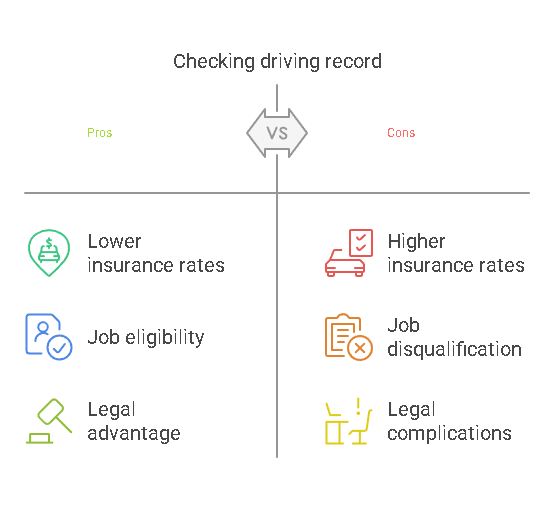
Impact on Car Insurance Rates
One of the most direct impacts of your driving record is on your car insurance premiums. Insurance companies rely on your driving history to assess risk. If you have a history of traffic violations, accidents, or license suspensions, your insurance premiums may rise. On the other hand, maintaining a clean driving record can help lower your rates and possibly qualify you for discounts.
Employment Opportunities
For job positions that require driving—such as delivery drivers, truck drivers, or company car drivers—employers will likely check your driving record. A poor driving history could disqualify you from these positions, while a good record could enhance your job prospects, showing that you’re a reliable and responsible individual.
Legal Considerations
Your driving record can also be a key factor in legal situations. For instance, in the case of a personal injury lawsuit or if you’re contesting a traffic ticket in court, your driving history will likely be reviewed. If your record shows a pattern of reckless driving or multiple accidents, it could affect the outcome of a legal case.
What Information is Included in a Driving Record?
Your driving record contains several key pieces of information:
- Traffic Violations: Any tickets or citations for moving violations, such as speeding, running a red light, or illegal parking.
- Accidents: Information about accidents you’ve been involved in, including the date, severity, and whether you were at fault.
- License Suspensions: Any suspensions or revocations of your driver’s license, along with the reasons for these actions.
- Points on Your License: Many states use a point system to track violations. Each ticket or infraction adds points to your record, and accumulating too many points can lead to suspension.
- Driving History: Any other important driving-related events, such as DUIs, reckless driving, or habitual violations.
How Long Do Violations Stay on Your Driving Record?
The length of time a violation stays on your driving record varies depending on the state and the severity of the violation:
- Minor Violations: For less serious infractions like speeding or running a stop sign, these typically stay on your record for 3 to 5 years.
- Serious Violations: Offenses such as DUI, reckless driving, or felony offenses can stay on your record for 7 to 10 years or longer.
- Accidents: Accidents, especially if they involve significant damage or injuries, might remain on your record for up to 3 years, depending on the state.
Why It’s Important to Regularly Check Your Driving Record
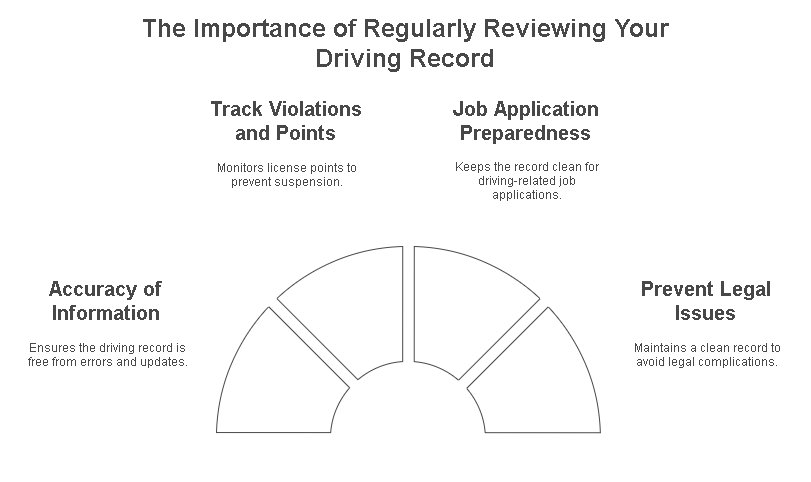
Regularly checking your driving record is an important habit for several reasons:
- Accuracy of Information: Mistakes can occur, and outdated information can appear on your record. For instance, you might have paid a ticket, but it could still be listed as unpaid. These discrepancies could affect things like insurance premiums or job applications. Checking your record regularly allows you to catch these errors before they cause issues.
- Track Violations and Points: Keeping an eye on your driving record allows you to track the points on your license. If you accumulate too many points in a short period, you may risk having your license suspended.
- Stay Prepared for Job Applications: If you’re applying for a job that involves driving, your employer may request a copy of your driving record. Ensuring your record is up-to-date and free of discrepancies will help you present yourself as a reliable candidate.
- Prevent Legal Issues: If you’re involved in a legal case related to driving (such as a personal injury case), your driving record may be reviewed. Ensuring that your record is clean and accurate helps avoid complications in these matters.
When Should You Check Your Driving Record?
There are specific situations where checking your driving record is highly recommended:
- Before Applying for a Job: If the job involves driving, many employers will conduct a driving record check. A clean record increases your chances of getting hired, while a history of accidents or violations could hurt your application.
- After a Ticket: If you receive a traffic ticket, checking your driving record can ensure that the information has been recorded accurately.
- When Shopping for Car Insurance: Your driving record affects your car insurance premiums. It’s a good idea to review your record before switching insurance providers or renewing your policy.
- After a License Suspension: If your license has been suspended or revoked, you should check your driving record to confirm that the suspension has been lifted and that there are no lingering issues.
How to Check Your Driving Record: Step-by-Step Guide
Now that you understand the importance of regularly checking your driving record, let’s take a look at how to actually obtain this information. There are various ways you can check your driving record, each with its own process, benefits, and potential costs. Whether you prefer to check your driving record online, via mail, or in person, this guide will provide clear, actionable steps.
How to Check Your Driving Record
The process for checking your driving record can vary depending on your state, but here are the general steps you’ll need to follow:
- Gather Required Information
To access your driving record, you’ll typically need to provide some personal information to verify your identity. This may include:- Your driver’s license number
- Full name and address
- Date of birth
- Social Security number (in some cases)
- Access the Appropriate Channel
You have several options for how you can check your driving record, including online methods, in-person visits, and requests via mail. Each method has its own pros and cons, depending on your convenience, speed, and cost preferences.
Different Ways to Obtain Your Driving Record
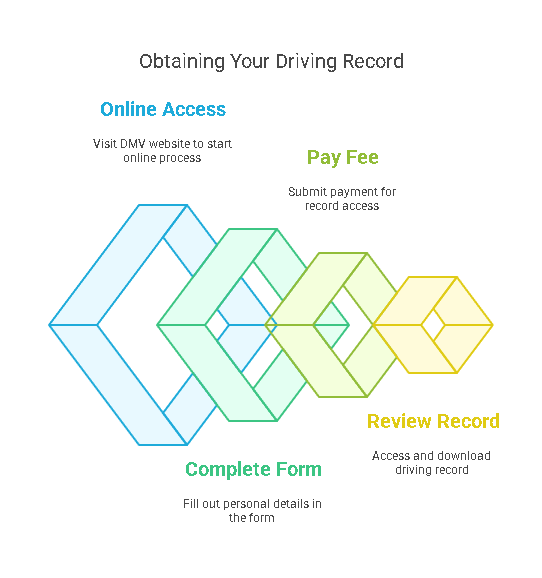
1. Online Access via DMV or Third-Party Websites
The quickest and most convenient way to check your driving record is online. Most states offer the ability to access your driving history through their DMV or similar government websites. In some cases, third-party services can also provide your driving record for a fee.
How to Check Online:
- Visit the DMV or State’s Department of Transportation Website: Go to the official website of your state’s DMV or Department of Motor Vehicles.
- Complete the Request Form: You’ll need to fill out a form with your personal details (driver’s license number, name, and date of birth).
- Pay the Required Fee: Most states charge a small fee for accessing your driving record online (usually around $5 to $15).
- Review Your Record: After processing, you will receive access to your driving record, which you can download or print.
Advantages:
- Fast and convenient
- Accessible 24/7
- Instant access to your driving record
Disadvantages:
- You may need to pay a fee for access
- Available only in states where online access is offered
2. In-Person Requests at Your Local DMV
If you prefer to access your driving record in person, visiting a DMV office is another option. This method may take longer than an online request but can be a good choice if you have trouble accessing the internet or prefer dealing with an in-person representative.
How to Check In-Person:
- Visit Your Local DMV: Find the nearest DMV office in your area.
- Bring Identification: Be sure to bring your driver’s license and possibly other forms of identification (e.g., passport or utility bill for address verification).
- Fill Out a Request Form: You’ll be asked to complete a form requesting a copy of your driving record.
- Pay the Fee: Expect to pay a small fee, typically $10 to $20.
- Receive Your Record: Depending on the office, you may receive your driving record immediately or within a few days.
Advantages:
- You can ask questions in person if you have concerns
- Ideal for people who prefer handling matters face-to-face
Disadvantages:
- You may have to wait in line
- The process could take longer, especially if you need to wait for the record to be processed
3. Requesting Your Driving Record by Mail
If you prefer a traditional method or cannot access online services, you can request your driving record by mail. This method may take longer than the other two options, but it can be a good choice if you’re unable to go online or in person.
How to Check by Mail:
- Fill Out a Request Form: Download and complete the request form from your state’s DMV website.
- Mail the Form: Send the completed form along with a copy of your identification and payment for the required fee (typically a check or money order).
- Wait for Processing: Processing can take anywhere from a few days to a couple of weeks depending on your state.
- Receive Your Driving Record: Once processed, you’ll receive your official driving record by mail.
Advantages:
- A good option if you prefer not to handle matters online
- Often cheaper than in-person requests
Disadvantages:
- Slowest method, taking days or weeks to complete
- You’ll need to mail payment and wait for your record to be mailed back
4. Third-Party Services
Several third-party websites offer driving record checks for a fee. These services usually gather records from multiple states and provide additional information about your driving history, including insurance claims, accidents, and traffic violations.
How to Check Using Third-Party Services:
- Visit a Reliable Third-Party Website: Many companies specialize in background checks and offer driving record checks as part of their services.
- Provide Your Information: Enter your personal information as required (license number, address, etc.).
- Pay for the Service: Fees vary based on the provider, but you can typically expect to pay around $10 to $25 for a driving record check.
- Review Your Record: After processing, you’ll receive access to your driving history.
Advantages:
- Can access records from multiple states
- May provide additional background information
Disadvantages:
- Usually more expensive than government websites
- May not always have the most up-to-date information
Comparing Methods of Checking Your Driving Record
| Method | Processing Time | Cost | Advantages | Disadvantages |
|---|---|---|---|---|
| Online DMV Portal | Instant (if available) | $5 – $15 | Fast, convenient, available 24/7 | Only available in certain states |
| In-Person Request (DMV) | Same day or 1-2 days | $10 – $20 | Direct interaction, fast in some locations | Requires travel and waiting in line |
| Mail Request (DMV) | 7-14 days | $10 – $20 | Reliable and official record | Slowest method, requires mailing payment |
| Third-Party Services | Instant | $10 – $25 | Convenient, may offer additional data | Higher cost, may not have official records |
Precisehire’s Services
For individuals and businesses that need thorough background checks, including driving records, Precisehire offers a reliable solution. Precisehire helps businesses streamline their hiring processes by providing accurate, up-to-date driving records, criminal background checks, and employment verification. Using a professional service like Precisehire ensures that the information you receive is comprehensive, accurate, and compliant with legal regulations. Whether you’re a business checking an applicant’s driving history or an individual reviewing your own record, Precisehire can save you time and effort.
Legal Aspects of Checking Your Driving Record
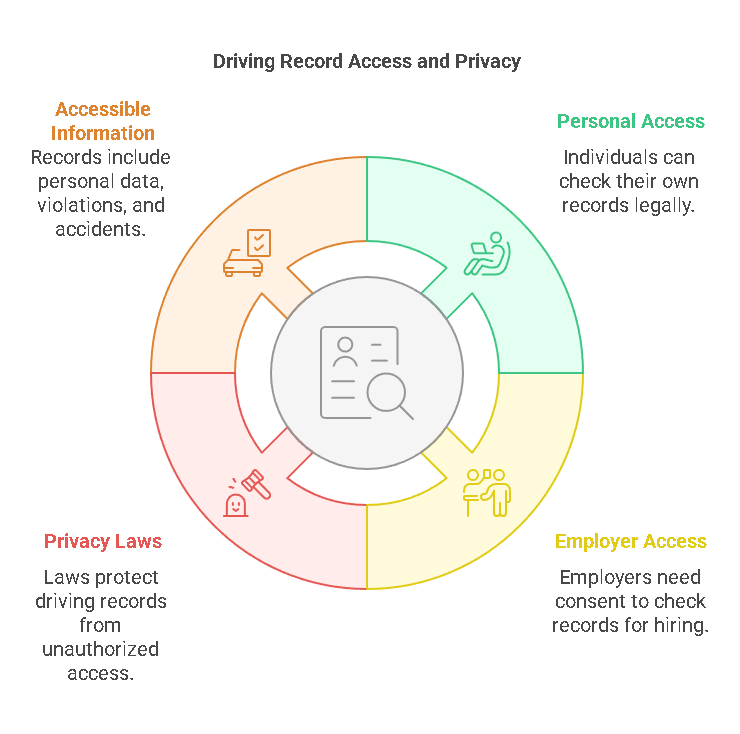
Before you proceed with checking your driving record, it’s important to understand the legal framework that governs the access and use of this information.
- Can You Check Your Own Driving Record?
Yes, you can legally check your own driving record. In fact, it is your right to obtain a copy of your personal driving history. This helps you verify that the information on file is accurate and up-to-date, especially if you’re concerned about any traffic violations, accidents, or suspensions that could be affecting your driving status.
- Can Employers Access Your Driving Record?
Employers can check your driving record, but only with your consent. Many businesses, particularly those in industries like transportation, delivery, and insurance, may require a driving record check as part of their hiring process. This is often done to ensure that potential employees have a clean driving history, which is crucial for workplace safety and liability concerns.
However, it’s important to note that employers are legally required to obtain written consent from the applicant before they request a driving record. Failure to obtain this consent could lead to legal complications for the employer.
- Privacy Laws Regarding Driving Records
Driving records are considered personal and are protected under various privacy laws. These laws regulate how and when this information can be shared. For example, the Driver’s Privacy Protection Act (DPPA) prohibits the disclosure of certain personal information in your driving record unless specific conditions are met (e.g., law enforcement purposes, job applications, or insurance matters).
Employers and third-party services must adhere to these privacy laws when accessing and using your driving record. If you believe someone has accessed your record without your consent, you may have legal recourse depending on the situation and jurisdiction.
- What Information is Accessible on Your Driving Record?
The information available on your driving record may include:
- Personal information (name, address, date of birth)
- Traffic violations (speeding tickets, red light violations)
- Accidents (whether you were at fault or not)
- License suspensions or revocations
- Points on your license
- DUI/DWI convictions (if applicable)
- Insurance claims (if shared with state databases)
Note that some states may have different regulations regarding the release of certain details. For example, in some jurisdictions, DUI/DWI convictions may remain on your record for a longer period, while in others, they may be expunged after a certain amount of time.
Frequently Asked Questions (FAQs) About Driving Records
How Often Should I Check My Driving Record?
It’s a good practice to check your driving record at least once a year to ensure its accuracy. You should also check it before:
- Applying for a job that requires driving
- Renewing your driver’s license to ensure there are no issues
- Shopping for car insurance as discrepancies may affect premiums
- After receiving a traffic ticket or being involved in an accident to verify if any violations have been recorded
Checking regularly helps you catch any errors or outdated information that could negatively affect you.
Can an Employer Check My Driving Record Without My Consent?
No, an employer cannot check your driving record without your consent. Employers must get your written permission before conducting a driving record check. In addition, the Fair Credit Reporting Act (FCRA) requires employers to inform you that they plan to use your driving record as part of their hiring decision, and you have the right to dispute any negative information they may find.
How Do I Remove Mistakes From My Driving Record?
If you find any errors or discrepancies on your driving record, such as incorrect traffic violations, accidents, or personal information, you can request a correction from your state’s DMV. The process typically involves:
- Contacting the DMV: Submit a formal request or dispute form along with supporting evidence to correct the information.
- Providing Documentation: You may need to submit court documents, accident reports, or other proof to validate your claim.
- Waiting for Review: The DMV will review your case and, if necessary, amend your record.
Be aware that removing some types of violations, like DUIs, may not be possible, as they are governed by state laws and can stay on your record for many years.
What Should I Do If I Have a Suspended License?
If your license is suspended, your driving record will reflect this status, and it’s crucial to address the underlying issue that caused the suspension. The process for reinstating a suspended license can vary by state but typically involves:
- Paying fines or penalties
- Completing required courses (e.g., traffic school, DUI education programs)
- Passing a driving test (in some cases)
- Paying a reinstatement fee
Make sure to follow all the steps required to regain your driving privileges and avoid further complications.
Will Checking My Driving Record Affect My Insurance?
Checking your own driving record will not impact your insurance premiums or rates. However, if your insurance company requests access to your driving record as part of a policy renewal or application, the details on your record (e.g., traffic violations, accidents, points) could affect your rates. A clean record generally leads to lower insurance costs, while a history of violations or accidents could result in higher premiums.
Conclusion
In conclusion, checking your driving record is an essential step in maintaining your personal and professional driving history. Understanding the legal considerations and knowing how to access your record will help you avoid surprises in the future. Whether you’re an individual reviewing your record for accuracy, an employer ensuring safe driving for employees, or a business relying on a professional service like Precisehire to check driving records, it’s important to follow the appropriate steps and legal requirements.
Regularly reviewing your driving record not only helps ensure its accuracy but can also protect you from potential legal issues, insurance rate increases, and even employment challenges. With the information provided in this guide, you can easily navigate the process of checking your driving history and ensure everything is in order for your safety and success.
